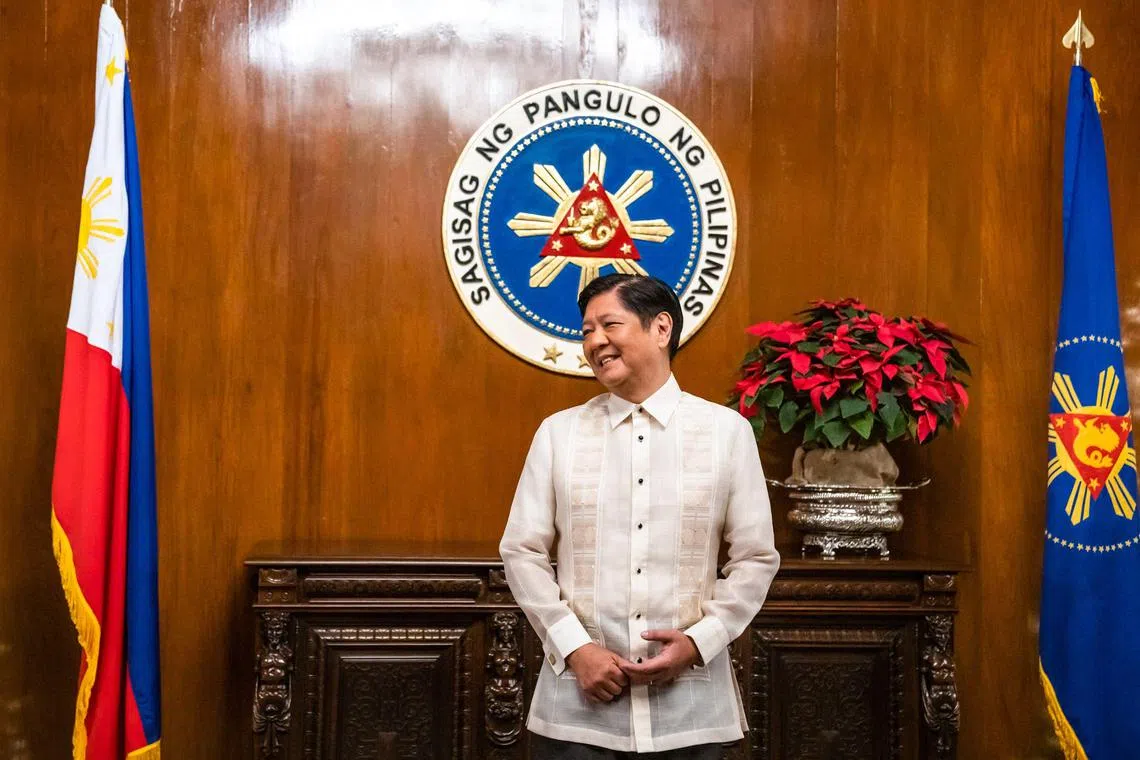Philippine President Marcos arrives in China for 3-day state visit
Sign up now: Get insights on Asia's fast-moving developments

President Ferdinand Marcos Jr will meet Chinese Premier Li Keqiang and President Xi Jinping during his trip.
PHOTO: AFP
MANILA - President Ferdinand “Bongbong” Marcos Jr arrived in China on Tuesday for a state visit,
More than 10 key bilateral agreements are expected to be signed during the three-day visit, in addition to the more than 100 deals the Philippines already has with China, said Mr Marcos in a speech on Tuesday before departing for Beijing.
The expected agreements are regarding cooperation in areas such as trade and investments, agriculture, renewable energy, infrastructure, development cooperation, people-to-people ties and maritime security cooperation.
“I will be opening a new chapter in our comprehensive strategic cooperation with China,” Mr Marcos said.
He also said he will discuss political security issues during his meeting with Chinese President Xi Jinping. Mr Marcos said he will also seek to resolve these issues with Beijing for the mutual benefit of the two nations.
At a palace briefing last week, Mr Neal Imperial, the assistant secretary for Asian and public affairs at the Philippine Department of Foreign Affairs, said: “The state visit is also expected to reaffirm the cordial and neighbourly relations between the two countries, ensure continuity in many facets of the bilateral relationship, and chart new areas of engagement.
“It is also expected to build on the growing trade and investment ties between the two economies, as well as address security issues of mutual concern.”
President Marcos is being accompanied on the trip by First Lady Liza Araneta-Marcos, former president Gloria Macapagal-Arroyo, Speaker Martin Romualdez, Foreign Secretary Enrique Manalo, Finance Secretary Benjamin Diokno, Trade Secretary Alfredo Pascual, Tourism Secretary Christina Frasco, Information and Communications Technology Secretary Ivan John Uy, and other department chiefs.
Mr Marcos’ activities begin on Wednesday, with successive meetings with Mr Li Zhanshu, chairman of the Standing Committee of the National People’s Congress, as well as with Chinese Premier Li Keqiang, and President Xi.
Mr Xi will then host a state banquet for his Philippine counterpart.
This will also be the second meeting between the two leaders after their meeting in Thailand in November
In September 1974, Mr Marcos, then a teenager, accompanied his mother, then First Lady Imelda Marcos, during her diplomatic and trade mission to Beijing, where she met Chinese leaders Mao Zedong and Zhou Enlai.
The visit led to the establishment of formal diplomatic relations between the Philippines and China in June 1975, with Mr Marcos’ father and namesake visiting Beijing that month.
Mr Imperial said a sizeable business delegation would be joining Mr Marcos on his trip, with meetings to be held on Wednesday and Thursday. Business deals, he said, are expected to be signed during the visit.
In his speech on Tuesday, Mr Marcos said that bilateral cooperation between the two countries has grown steadily. “Today, our ties are deep, multifaceted, and mutually beneficial.”
He added: “China is our largest trading partner, a major source of official development assistance, and, before the pandemic, the second-largest source of tourist arrivals.”
As the Philippines opens up in the new normal of the pandemic, Mr Marcos said that he will “invite our Chinese neighbours to once again return to the Philippines as tourists, as students, investors”.
He said: “I shall push for the resumption of tourism and cultural cooperation between our two countries.”
Mr Marcos is also expected to raise anew the issue of the West Philippine Sea.
Mr Imperial added that Manila and Beijing have agreed to sign an accord establishing direct communication between their foreign ministries to avoid miscalculation and miscommunication in the West Philippine Sea.
The agreement will be signed by Foreign Secretary Manalo and top Chinese diplomat Wang Yi.
PHILIPPINE DAILY INQUIRER/ASIA NEWS NETWORK, BLOOMBERG


